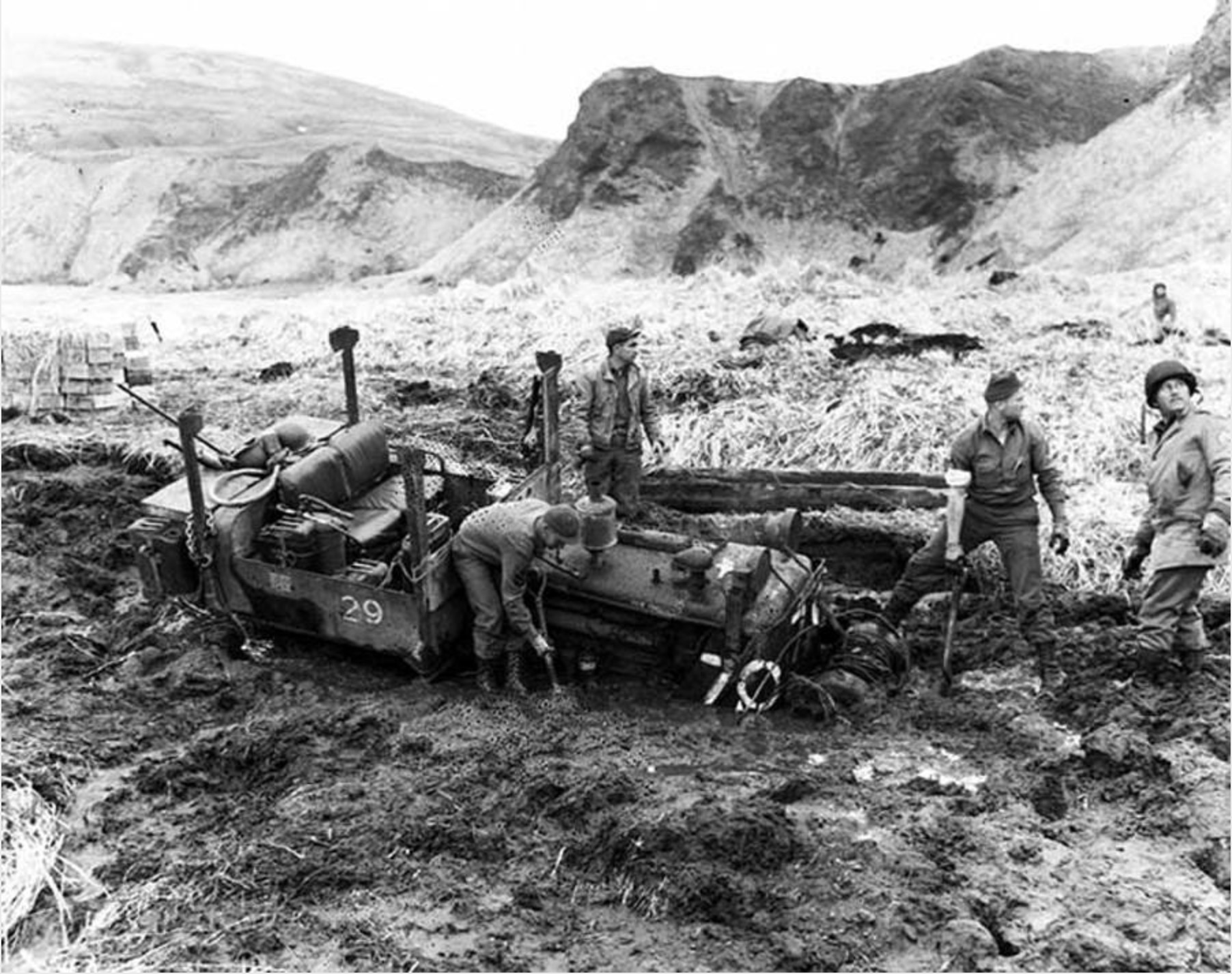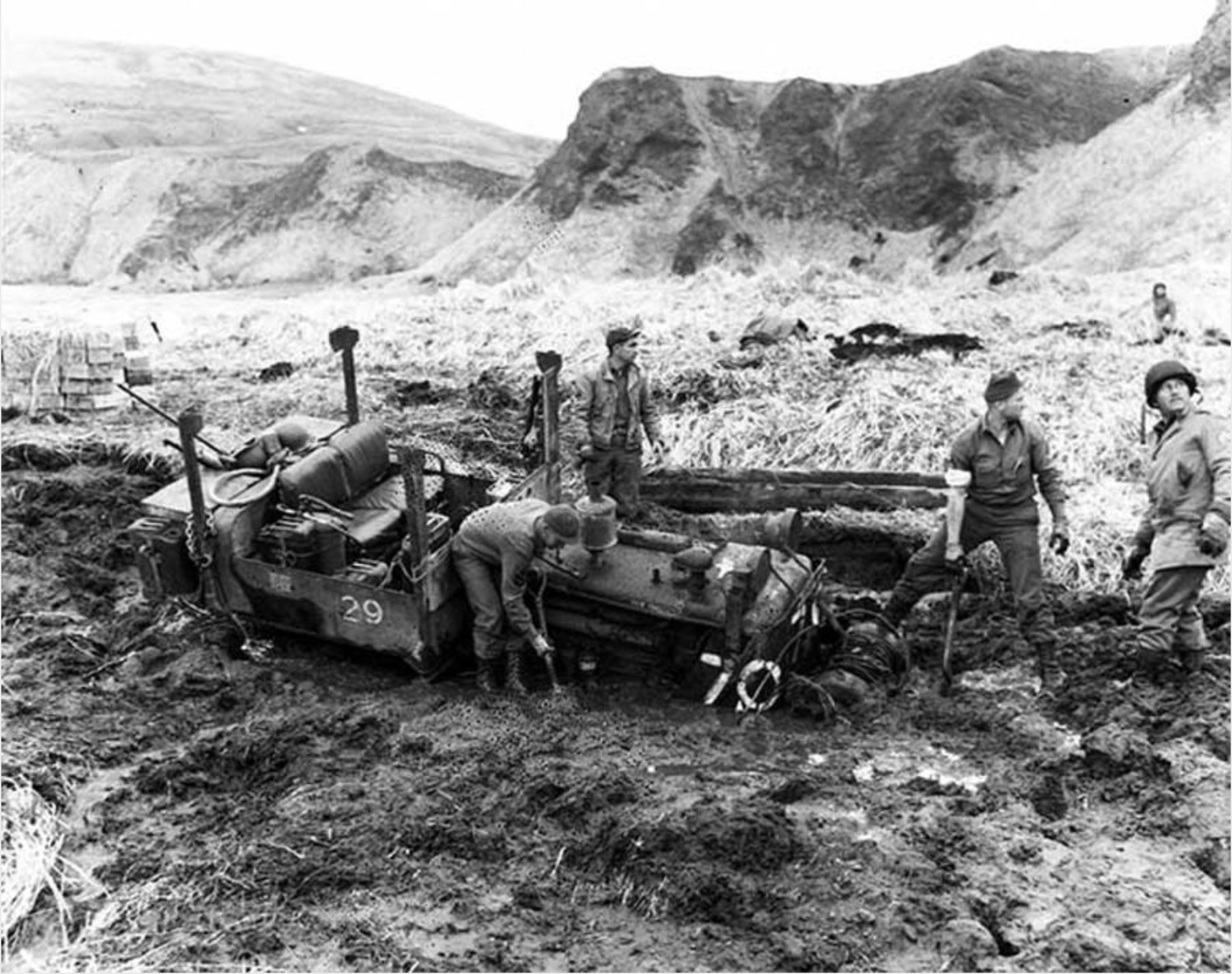

A New Mexico National Guard unit that lost half of its soldiers in the Philippines and Alaska Natives who endured the only Japanese occupation of U.S. soil in World War II may soon be honored with a Congressional Gold Medal, if two New Mexico lawmakers get their way.
New Mexico Sen. Martin Heinrich and Rep. Teresa Leger Fernández reintroduced a bill that would award Congressional Gold Medals to American veterans who fought in often-doomed early World War II battles, including Bataan, Corregidor, and Mindanao in the Philippines, Midway Island, Wake Island, Guam and Java.
Among the units specifically honored in the bill are two New Mexico National Guard units which sent more than 1,800 troops to the Philippines in 1941, only to see nearly half never make it home.
The medals would also honor dozens of Saskinax people who lived on Attu, an Aleutian Island in Alaska that was invaded by the Japanese during the war. Most of the Saskinax? population was taken prisoner and moved to Japan for most of the war.
The legislation was previously introduced in 2021.
Defensive battles of the Pacific
According to the bill text, the Congressional medal would apply to U.S. service members who fought in “defensive battles” in the Pacific from Dec. 8, 1941 to June 9, 1942. These battles, long before the more famous ‘island hopping’ campaigns of advancing U.S. forces, were fought mainly by U.S. garrisons that were in place across the Pacific before Pearl Harbor. Built in peace-time, these units came under attack — often without reinforcements or up-to-date weapons — by Japanese forces in the war’s early months. The medal would also be granted to any troops who ended up as Japanese POWs through the end of the war and to civilians who the Japanese deemed military prisoners of war. Many civilians caught in the battles eventually received veteran status after the war. The legislation would not include members of the Pacific Fleet or the Hawaiian Department.
The legislation highlights what is known as the “forgotten battle” in which the Japanese Army infiltrated the Aleutian Islands of Alaska during the Battle of Attu. It was also arguably one of the coldest and snowiest battles that U.S. troops faced in the Pacific.
The muddy, wet “land could barely support the weight of a soldier, much less vehicles or artillery guns, forcing the [7th Infantry Division] to have [to] fight the island’s terrain itself as well as the Imperial forces there,” according to an Army release.
Japanese forces seized the small and sparsely inhabited island in the far west of Alaska’s Aleutian chain in June 1942. American forces retook the island in a three week battle in May 1943 when more than 15,000 Americans faced off against roughly 2,400 Japanese soldiers. Nearly 550 Americans died, more than 1,000 were wounded, and 2,100 had to be evacuated for disease and non-battle injuries that were mostly from extreme cold temperatures, according to the Army.
In 2023, Gregory Golodoff, the last survivor of Attu’s 41 residents who were imprisoned in Japan died at 84. He was 3 years old when Japanese forces took the island. Three of his siblings died in captivity. When survivors returned from Japan, they were not allowed to go back to their home and instead were taken to the neighboring island of Atka.
Subscribe to Task & Purpose today. Get the latest military news and culture in your inbox daily.
Other veterans honored in the bill include those of Bataan and Corregidor, which fell in April 1942. Nearly 75,000 American and Filipino troops spent years in Japanese-run prisoner of war camps after enduring the infamous 60-mile trek to the prisons during the Bataan Death March. Troops experienced intense tropical heat and went without food, water, or medical care and roughly 10,000 died from starvation, exhaustion, and abuse. Others died in unmarked Japanese Navy “hell ships” as they were transported out of the Philippines because they were targeted by Allied Forces.
New Mexico
The bill specifically names New Mexico guardsmen from the 200th and 515th Artillery regiments in the bill for being the ‘‘first to fire’’ in the Philippines at the Japanese Army. The units had arrived in the Philippines and were stationed north of Manila to defend Clark Field.
“The American and Filipino defenders of Bataan and Corregidor demonstrated an unimaginable level of courage and strength in the face of unimaginable abuse,” Leger Fernández said in a release. “The Bataan Death March was a horrific example of cruelty and inhumanity. Especially as so many are passing, it’s time we recognize the Bataan and Corregidor veterans—including many New Mexican heroes—with the highest honor.”
In the Senate, the bill is supported mostly by Democrats with one Republican, Sen. Thom Tillis from North Carolina. The legislation is endorsed by the American Defenders of Bataan and Corregidor Memorial Society, the New Mexico National Guard, the Bataan-Corregidor Memorial Foundation of New Mexico, and Attu Forever.
“Our fathers and mothers made huge sacrifices in service to their country — their war lasted the full duration of WWII,” Jan Thompson, President of the American Defenders of Bataan and Corregidor Memorial Society said in a release. She also commended Heinrich for bringing attention to one of the first defensive battles in the Pacific and veterans who endured prisoner of war camps for the duration of the war.
Maj. Gen. Miguel Aguilar, Adjutant General of the New Mexico National Guard said in a release that “despite abhorrent conditions and insufficient resources,” like being cut off from supply lines and reinforcements, the defensive campaign of the Philippine islands in Manila Bay by the 200th and the 515th Coast Artillery units delayed the Japanese Army’s plans to take over the Pacific.
